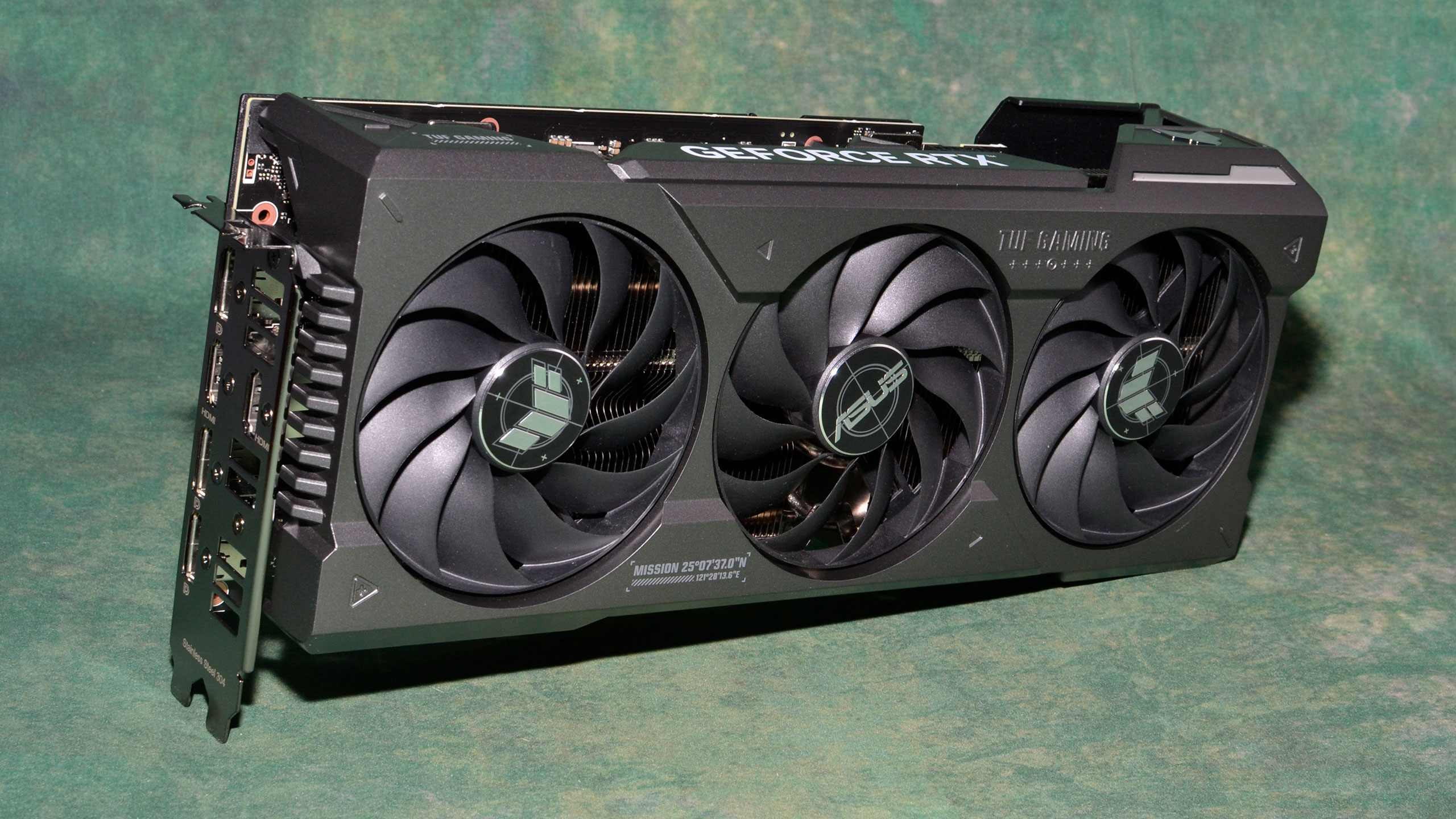Why you can trust Tom's Hardware
Nvidia RTX 4070 Ti Super AI Performance
GPUs are also used with professional applications, AI training and inferencing, and more. Along with our usual professional tests, we've added Stable Diffusion benchmarks on the various GPUs. AI is a fast-moving sector, with many of the publicly available projects designed specifically to run on Nvidia GPUs. That may be changing, slowly, but Nvidia has a reputation as the leader in AI for a reason right now.
For our AI testing, we're using Automatic1111's Stable Diffusion project for the Nvidia cards, with the TensorRT extensions enabled. Intel has an OpenVINO fork of Automatic1111's repository, which shows about a 50% improvement over our previous testing. Finally, AMD has a DirectML fork of Automatic1111 that appears to be mostly tuned for the RDNA 3 GPUs we're testing.
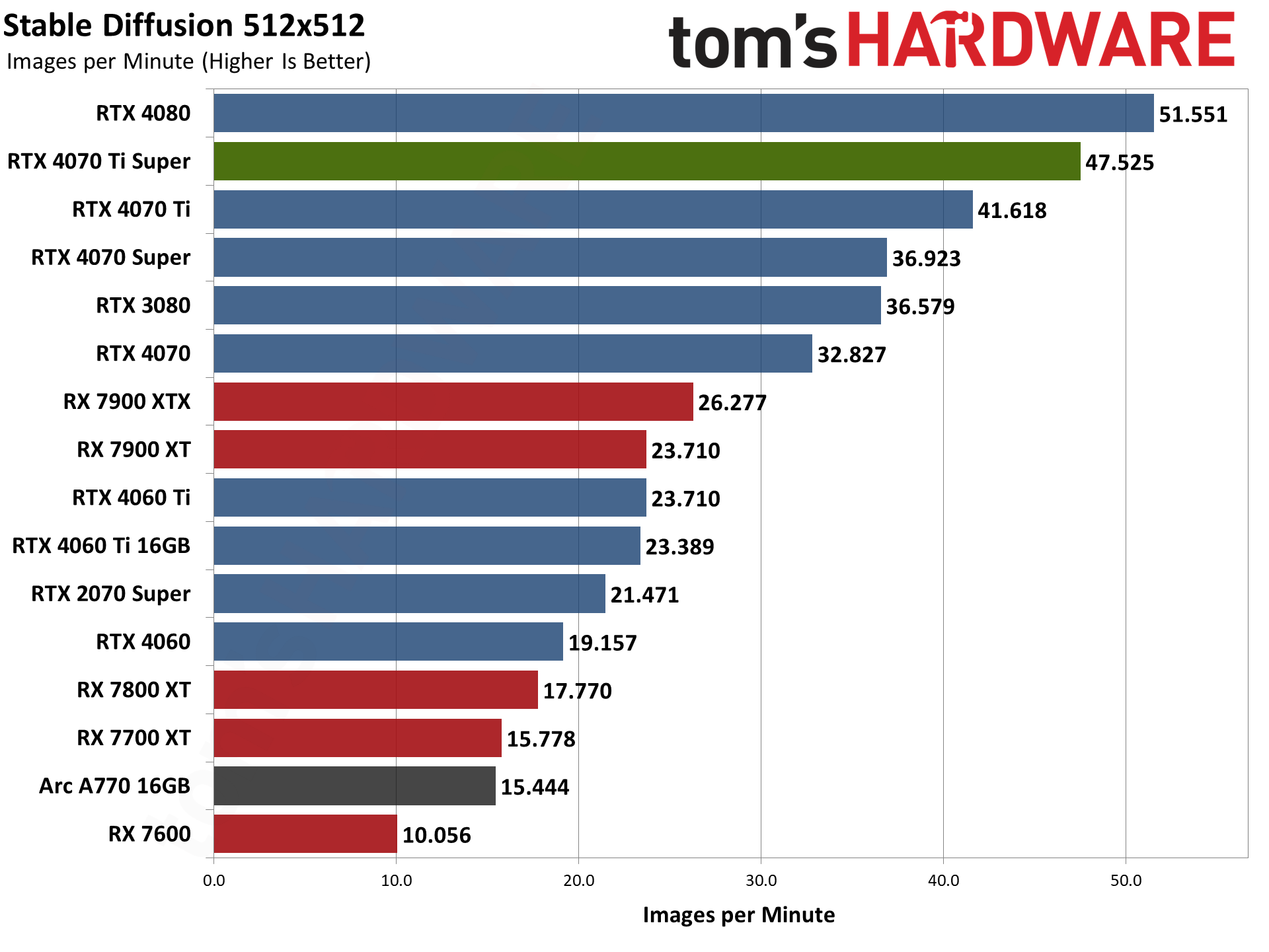
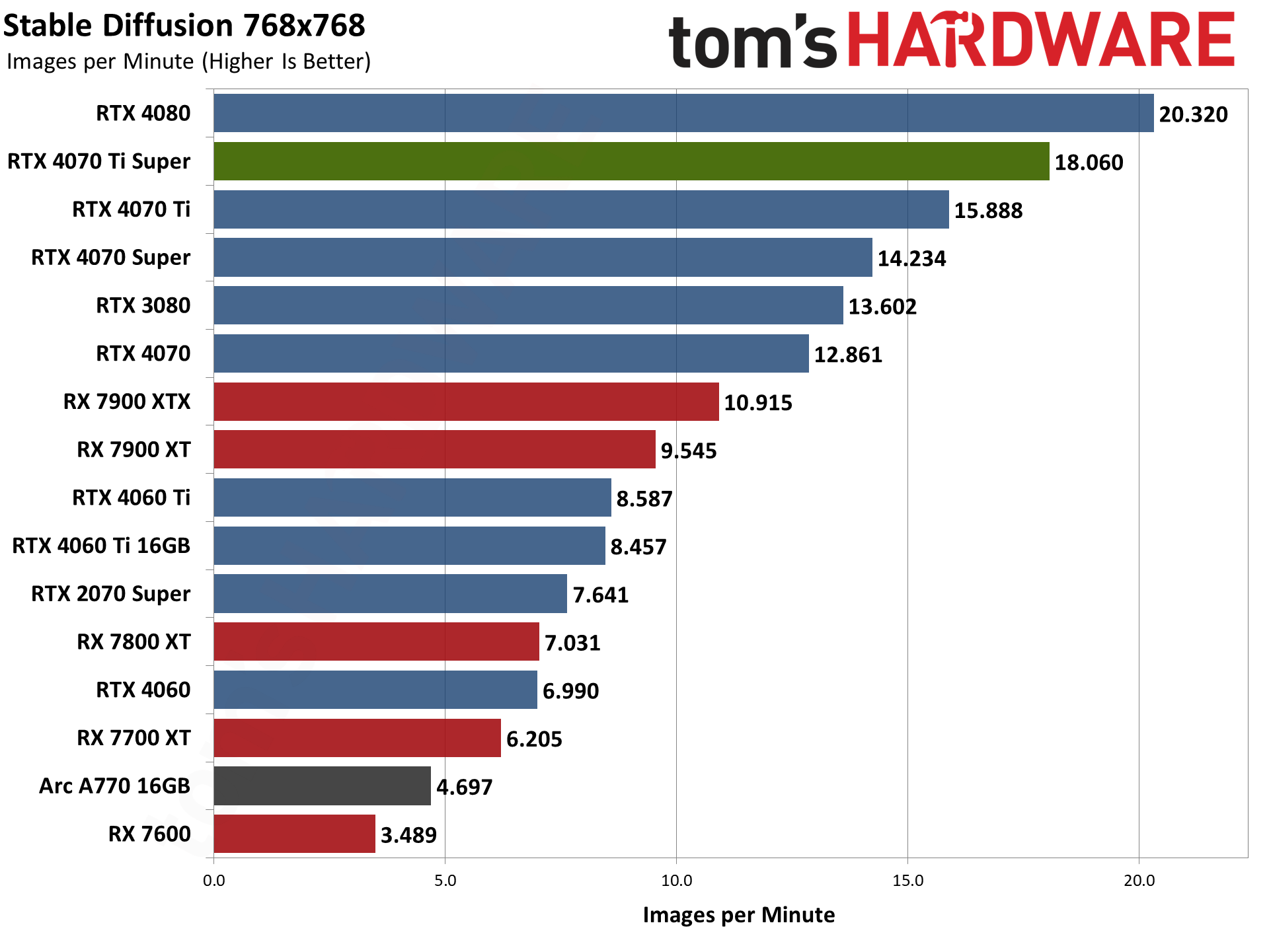
Given what we've seen so far, it should be little surprise that the 4070 Ti Super lands right between the vanilla 4070 Ti and the 4080 in our Stable Diffusion tests once again. We're not using models that will benefit from the extra VRAM, but VRAM bandwidth does appear to be a bigger factor here, and the new GPU ends up closer to the 4080 than the vanilla 4070 Ti this time.
AMD's fastest consumer GPUs are still far behind what we're able to get from Nvidia's offerings. The results here mimic the heavy DXR results at higher resolutions, with the 4070 Ti Super beating the 7900 XTX by 81% for 512x512 image generation, and 66% for 768x768 images.
Nvidia RTX 4070 Ti Super Professional Workloads
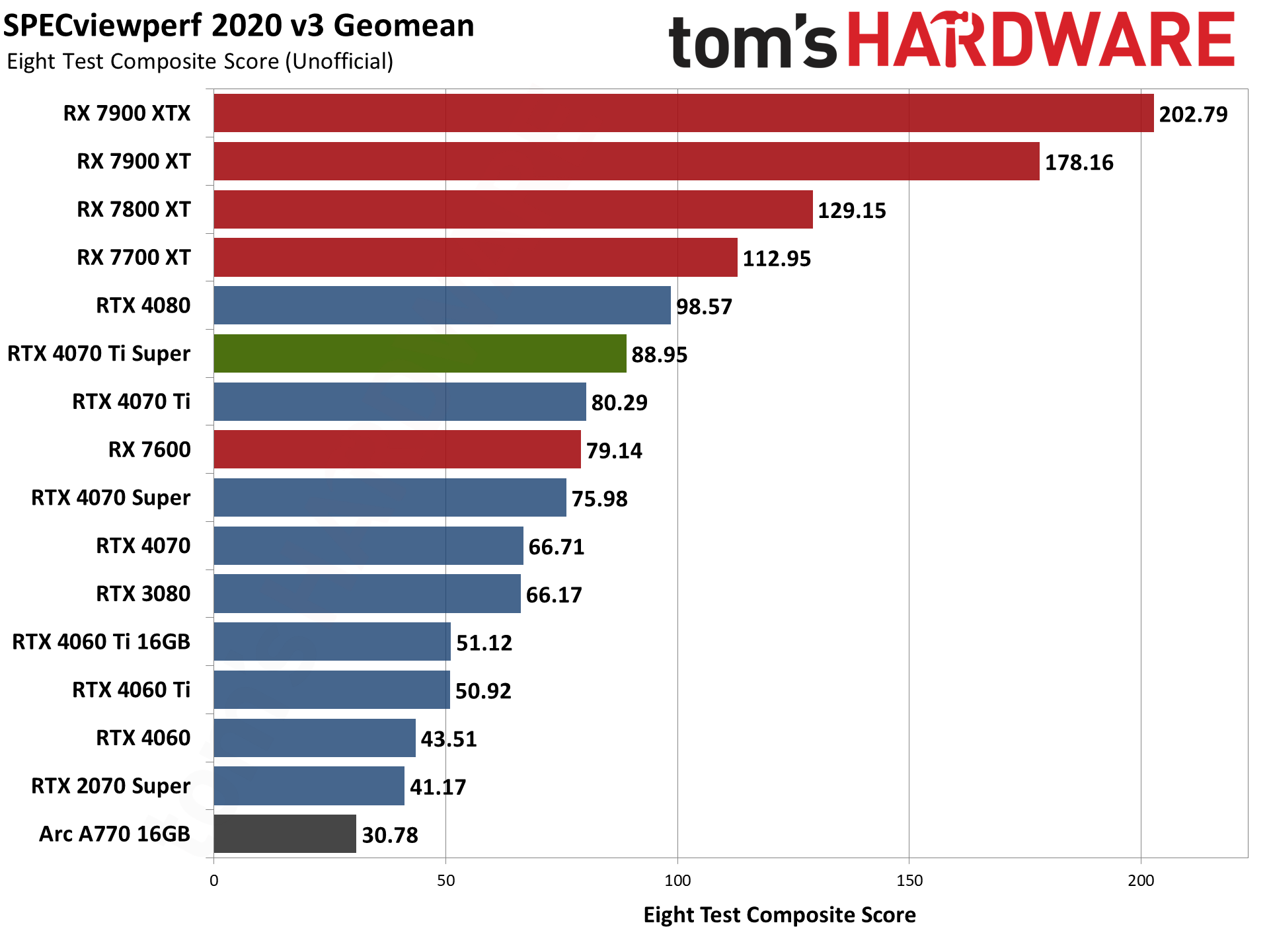
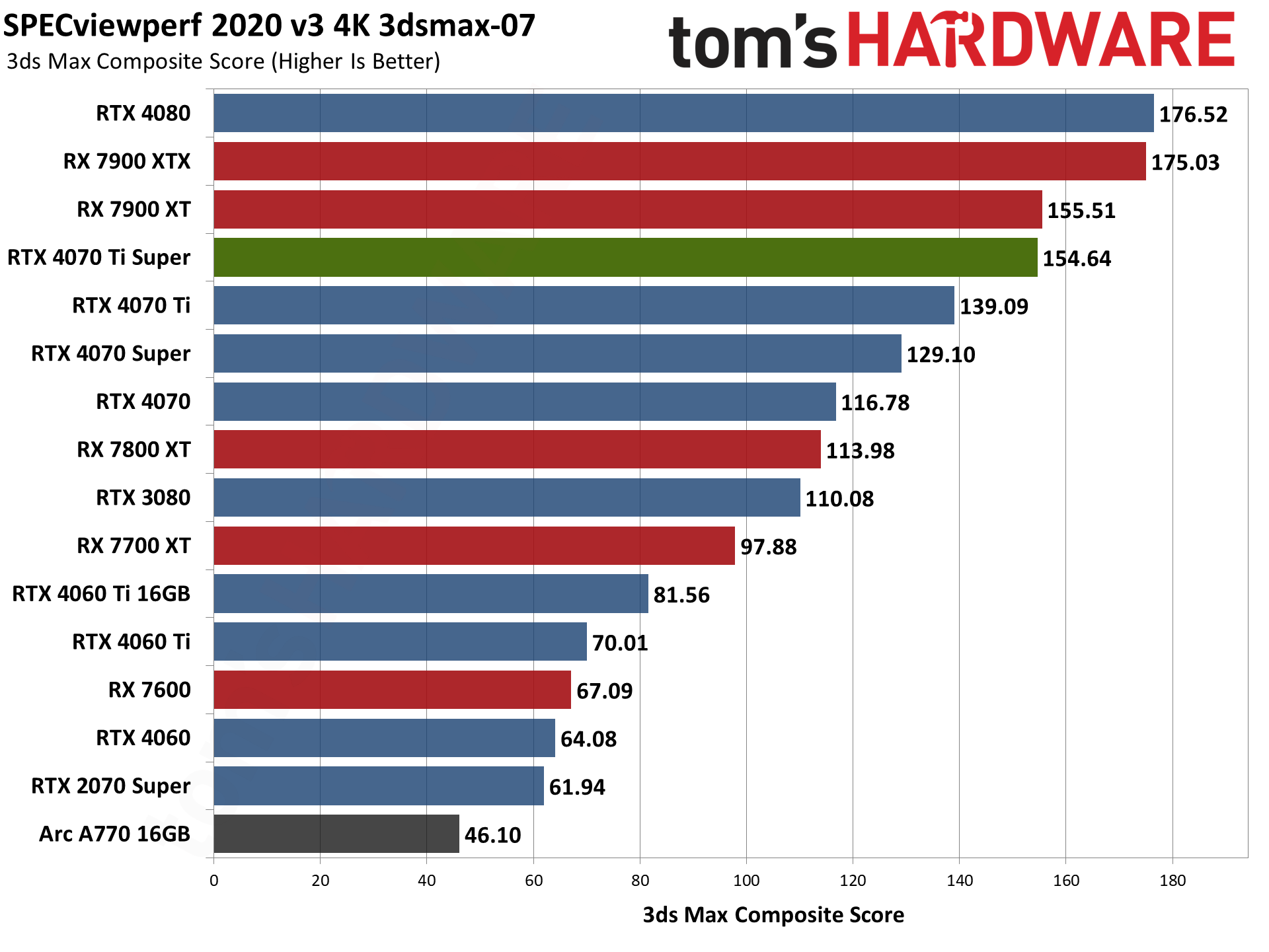
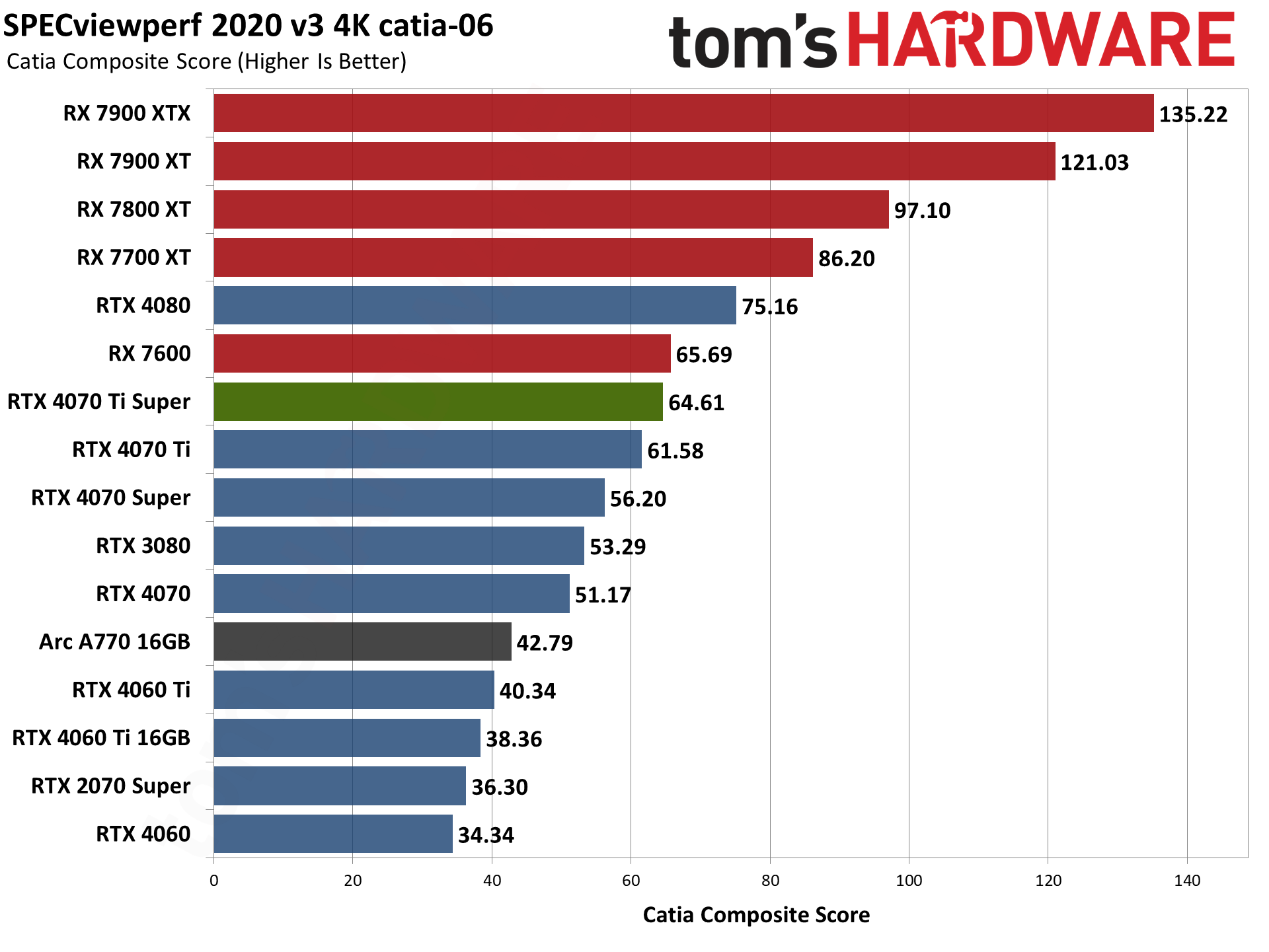
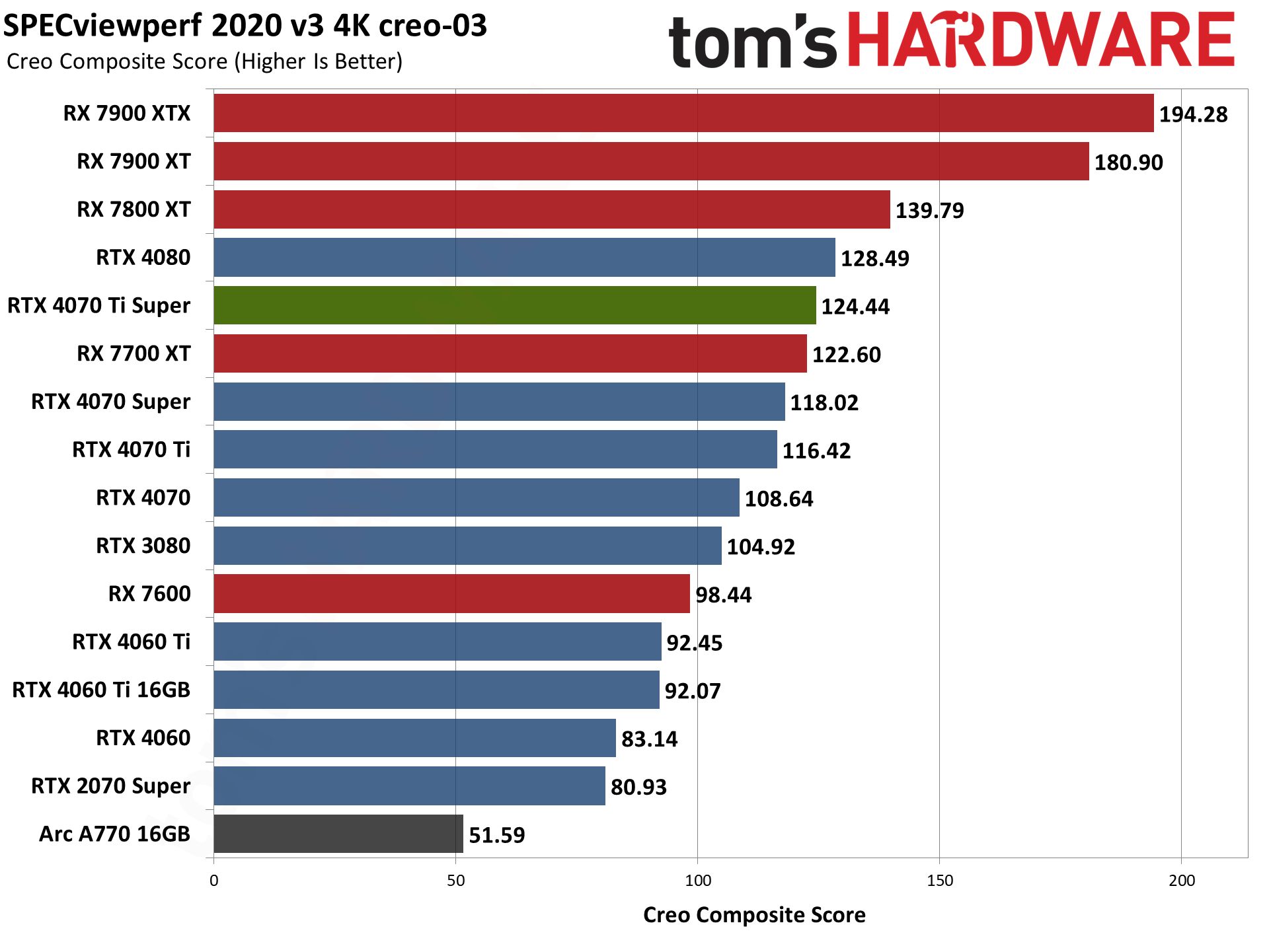
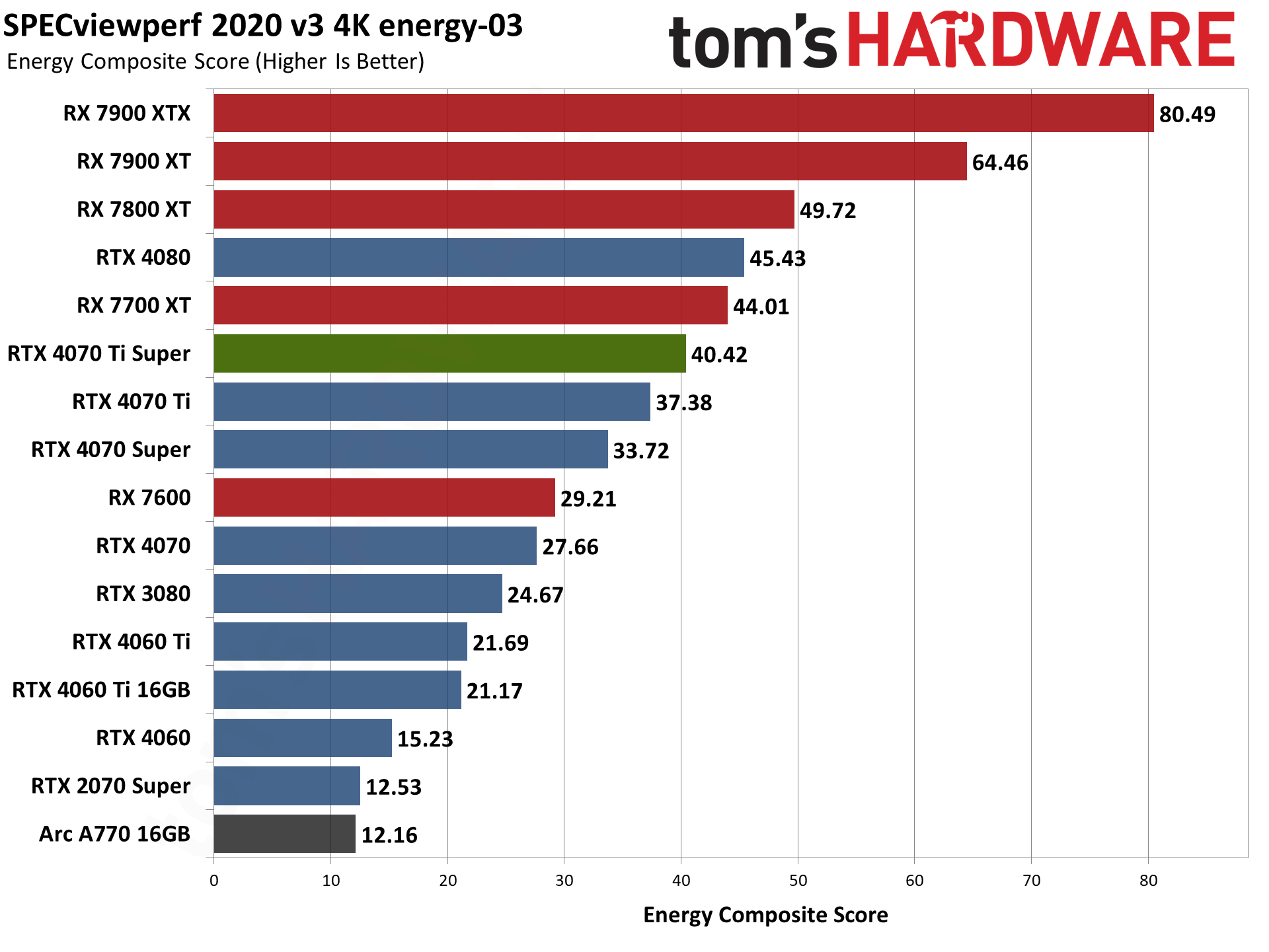
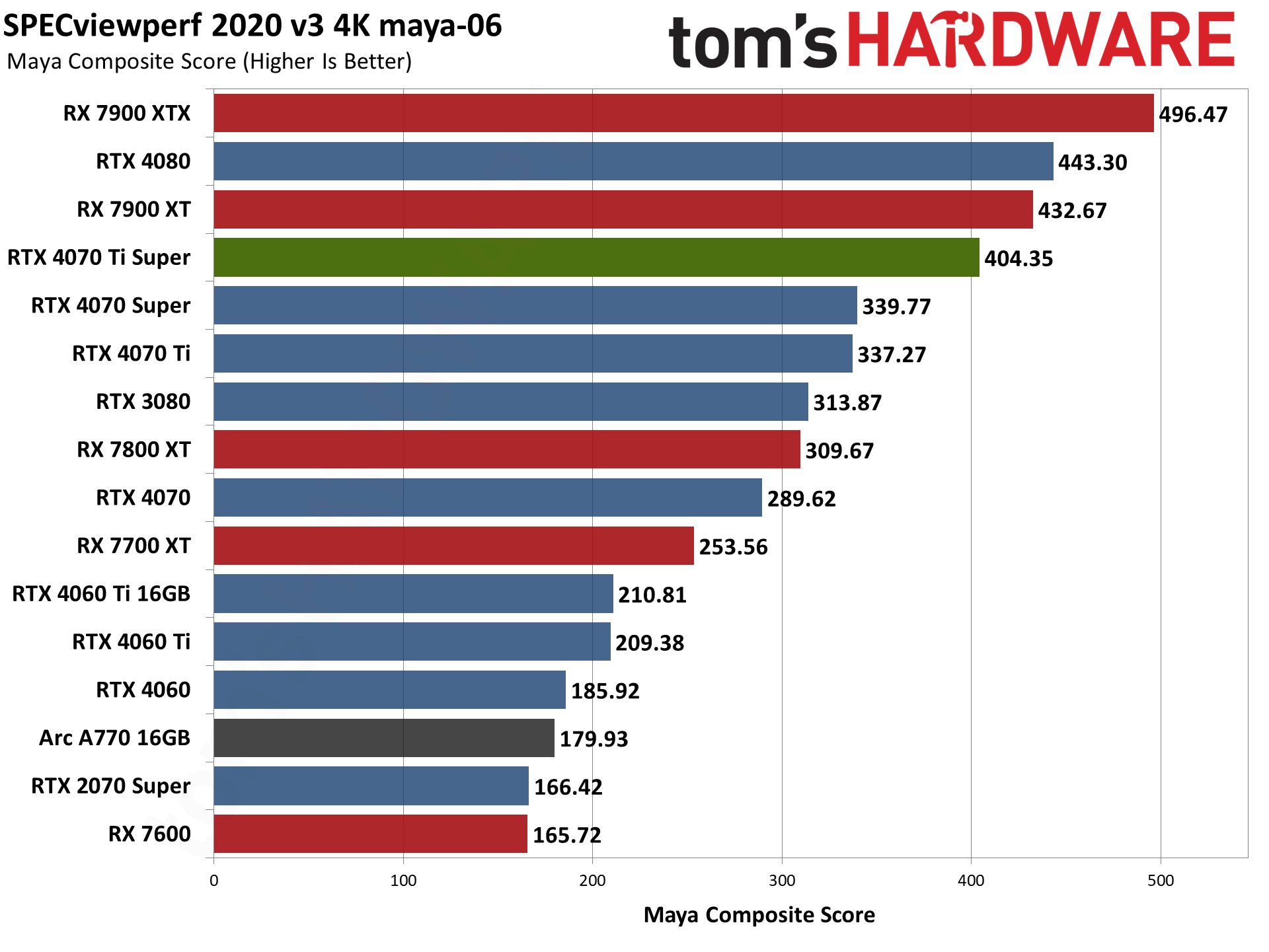
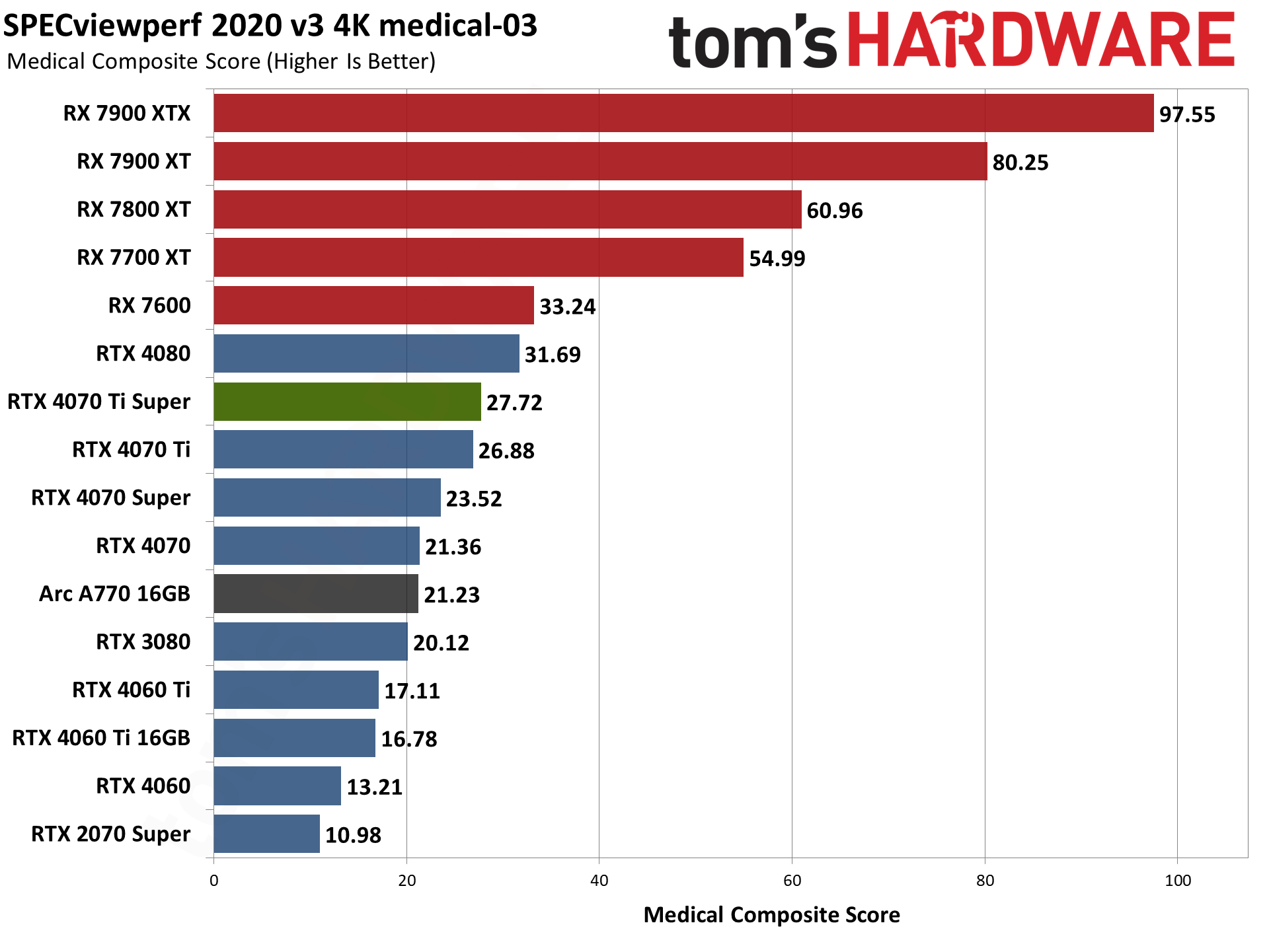
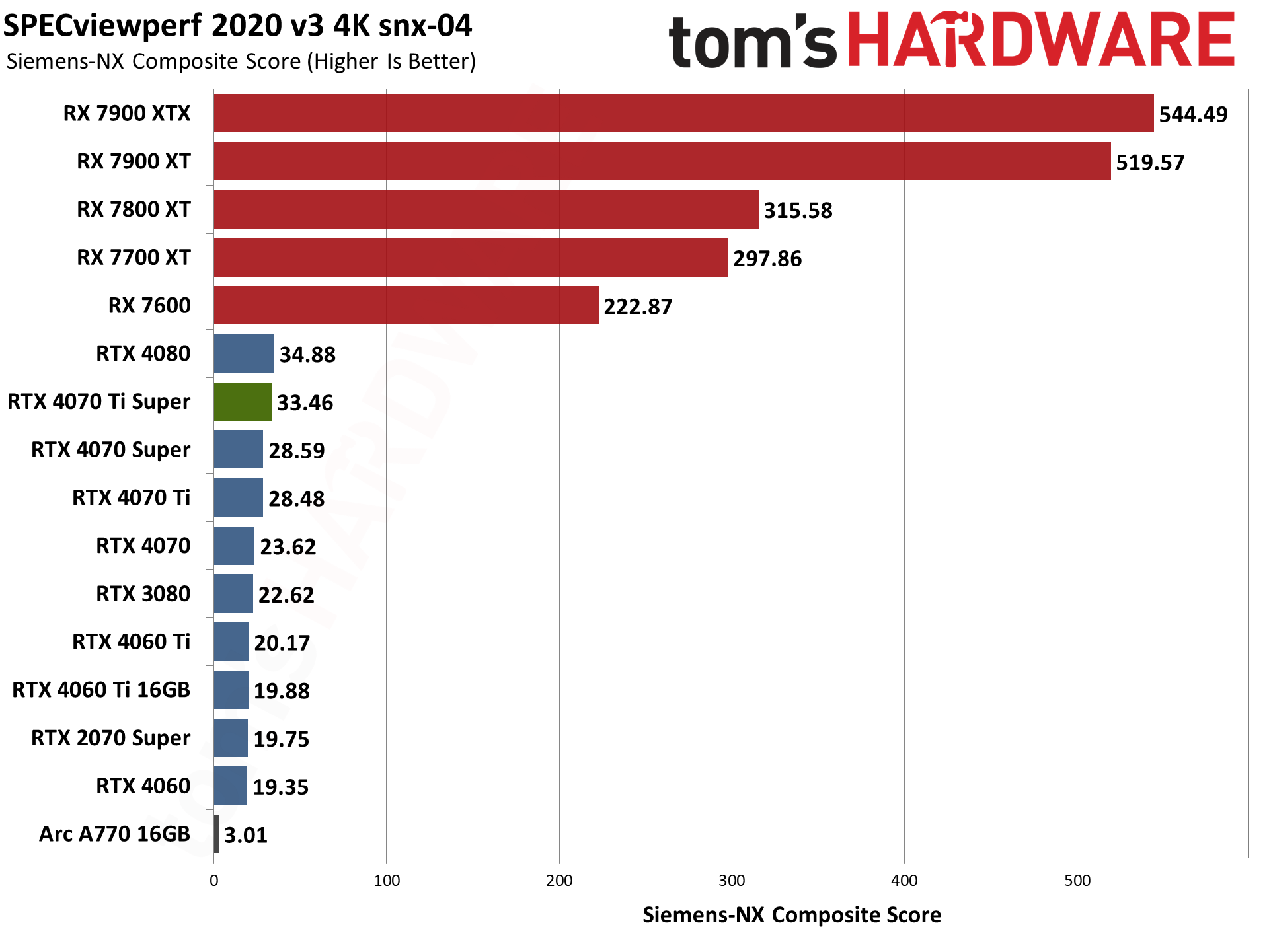
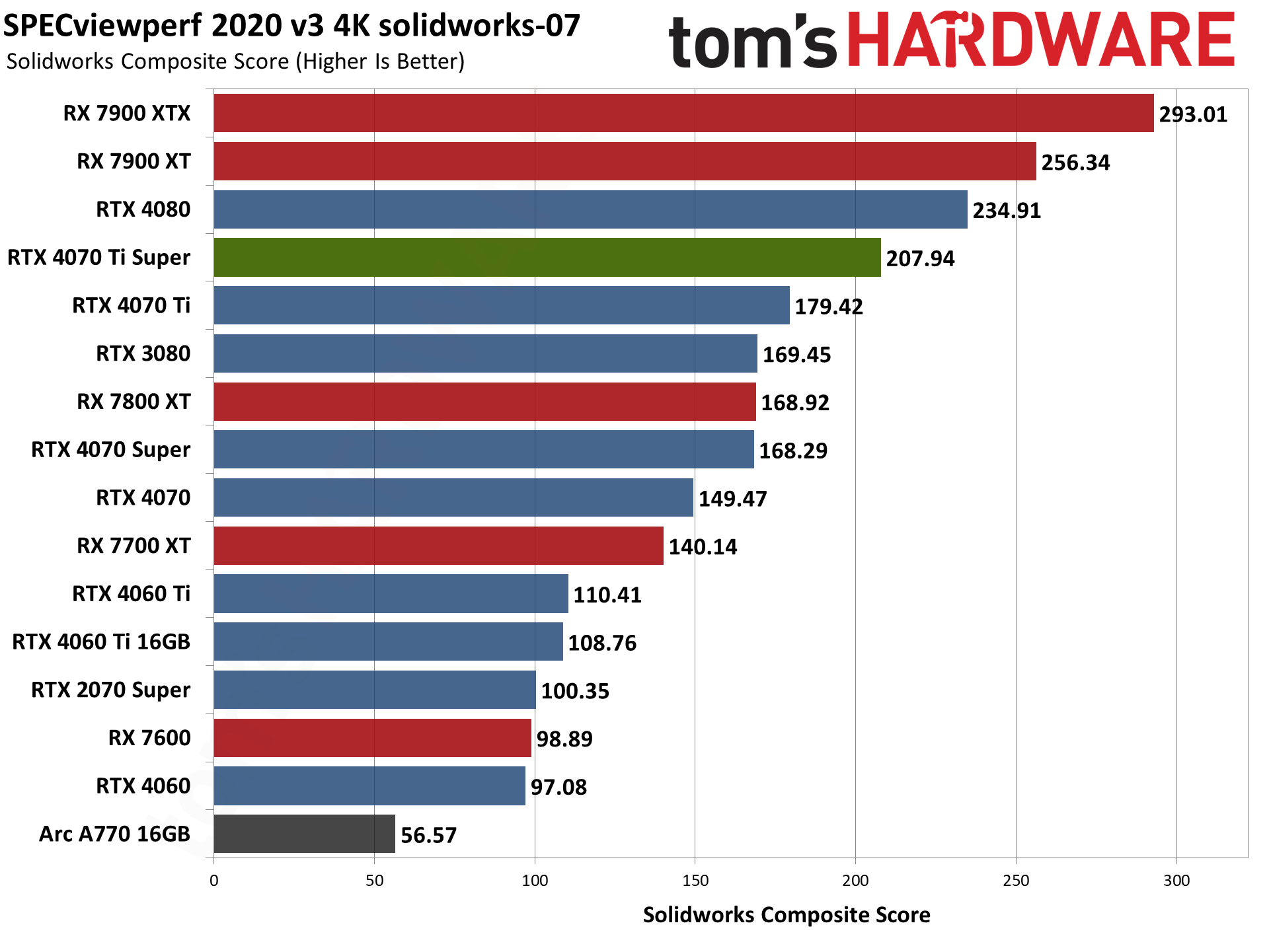
We use SPECviewperf 2020 v3 to assess professional workstation graphics performance on the various GPUs. Nvidia only offers full performance tuning in its drivers for professional GPUs like the RTX 5000 Ada Generation, while AMD tends to be more forthcoming with driver tuning for its consumer cards.
The overall view of performance using the geometric mean of all eight tests puts the 4070 Ti Super just 12% ahead of the RX 7600, and well behind all the other AMD GPUs. In the individual tests, the best Nvidia's new GPU can do is to basically tie the RX 7900 XT in 3dsmax and trail by only 7% in Maya. But the real discrepancy is in Siemens NX, where even the 7600 is about seven times faster than the 4070 Ti Super, and the 7900 XT is over fifteen times faster.
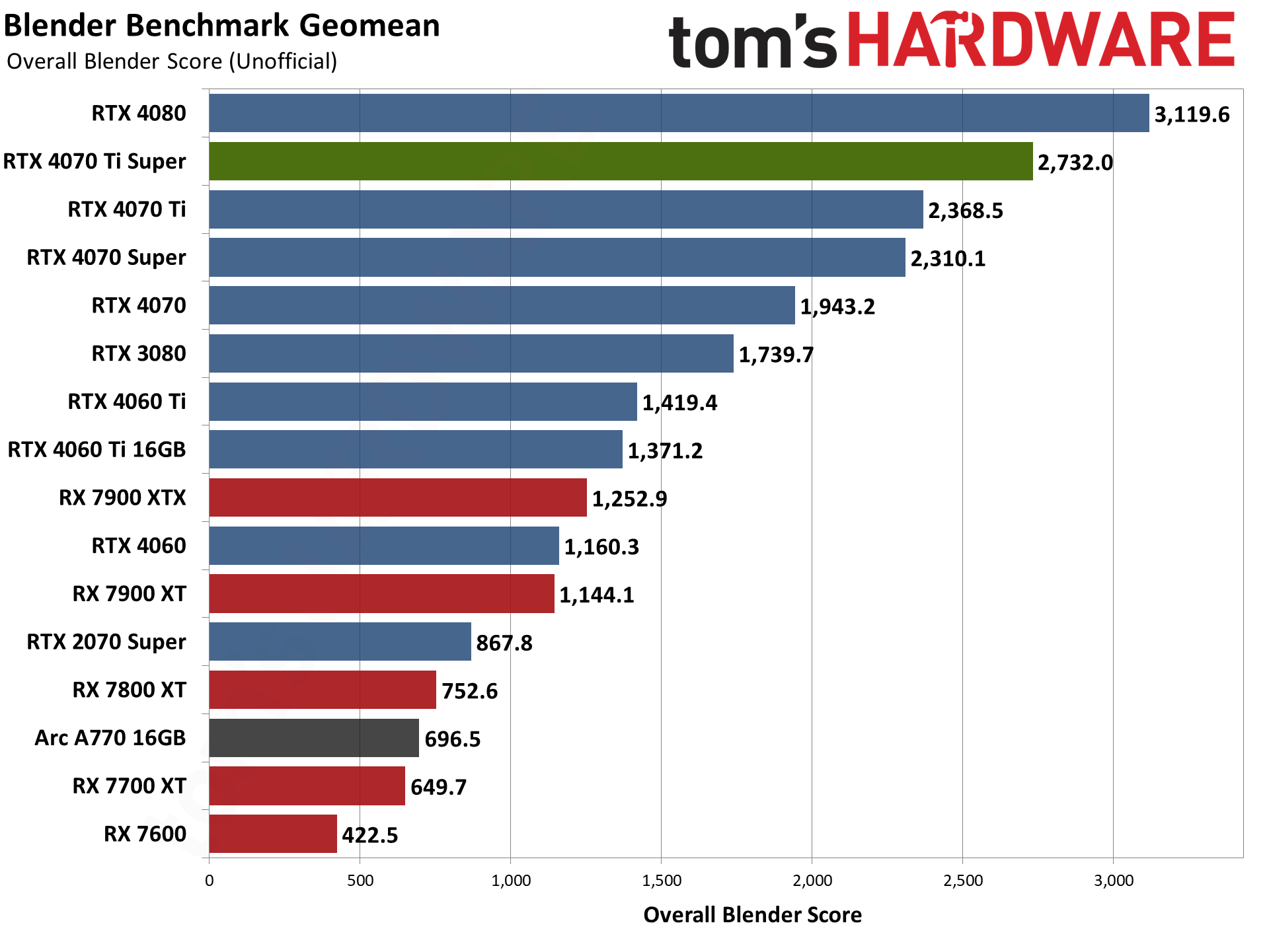
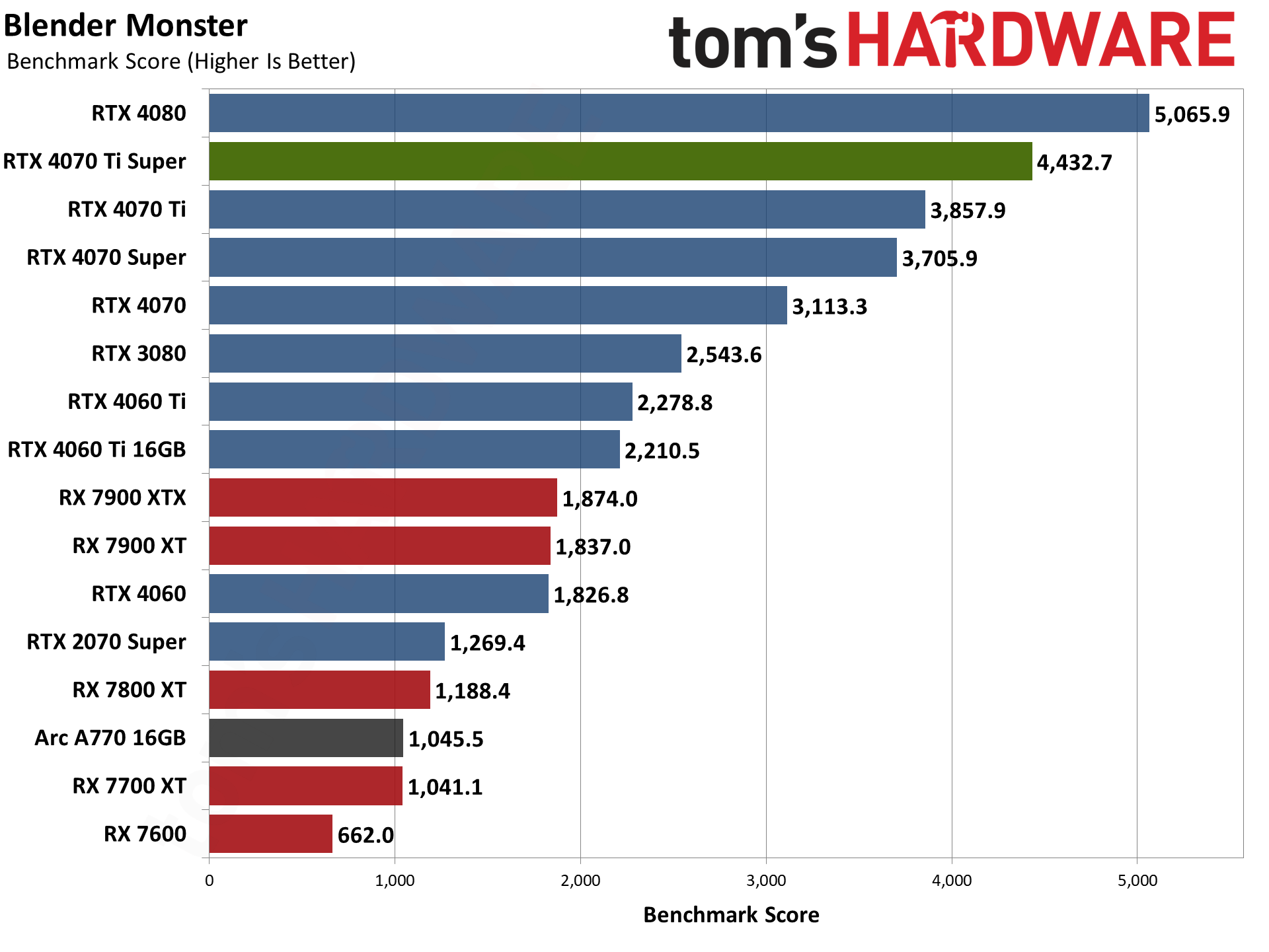
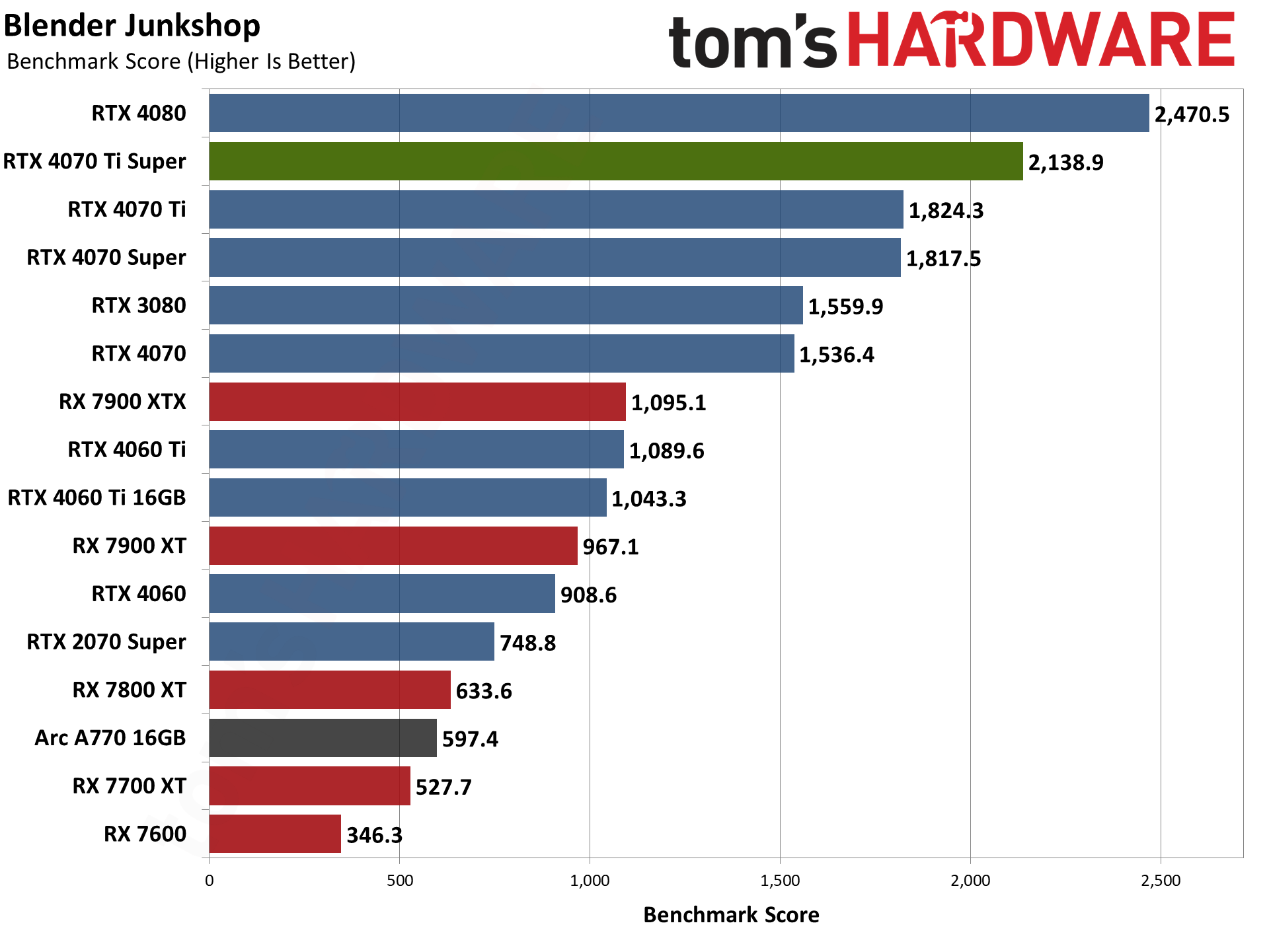
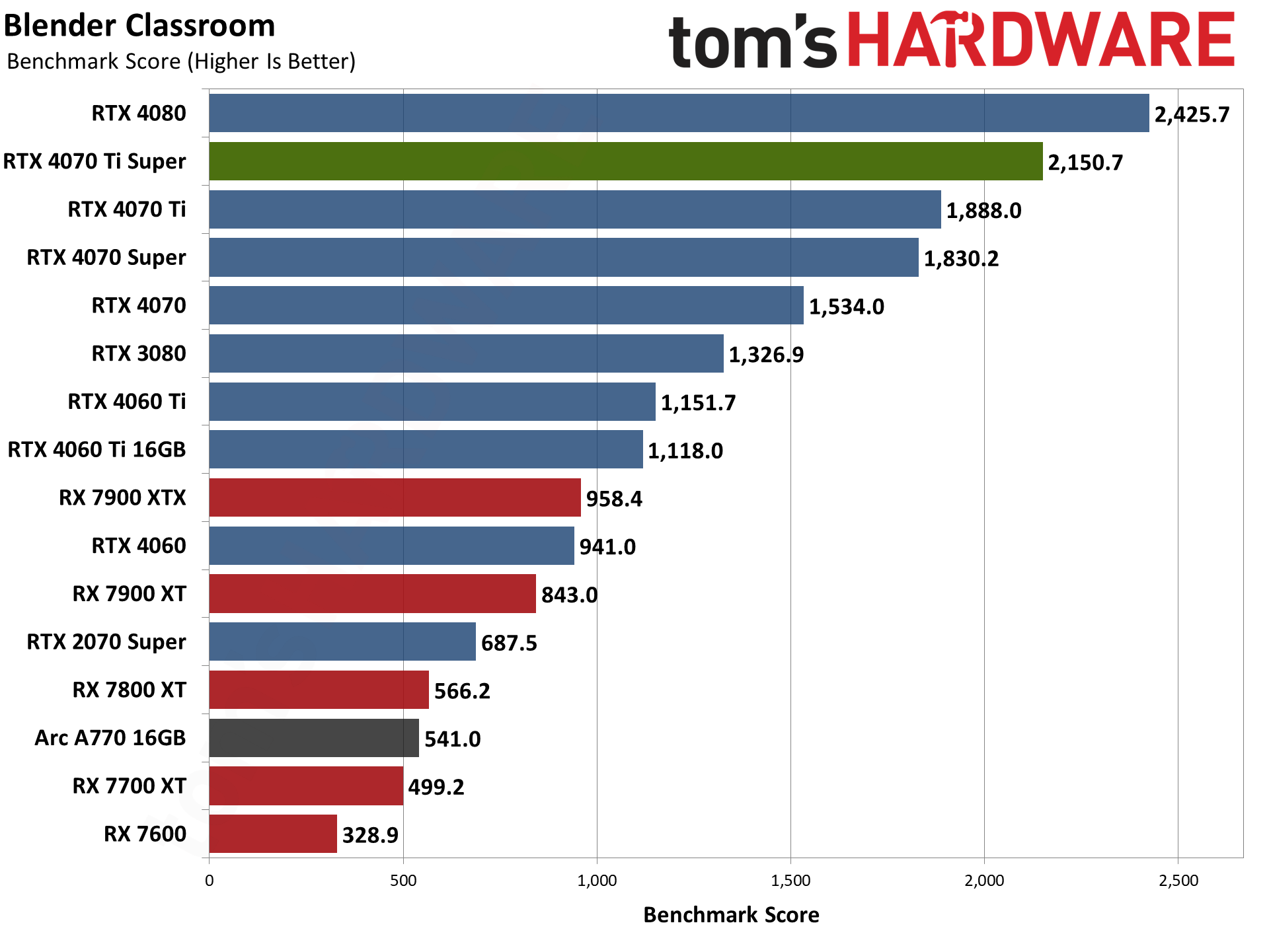
For GPU-accelerated 3D rendering, the only app that currently supports all three GPU vendors is Blender. It now leverages the ray tracing hardware to boost performance, and that generally puts Nvidia in the pole position. We're using Blender Benchmark, version 3.6.0, though version 4.0.0 is also available. We've found some GPUs, including all of the Nvidia models, perform better with version 3.6.0, and it's not clear whether 4.0.0 executes the same workload or if it does extra calculations to deliver a better result.
As we've seen in our ray tracing gaming tests, Nvidia's GPUs come out far ahead of AMD's competing offerings. The 4070 Ti Super in this case outperforms AMD's 7900 XTX by 118% in our Geomean. Also, it's slightly closer to the 4080 than the 4070 Ti again, 12% slower than the former and 15% faster than the latter, so Blender appears to like the extra bandwidth as well.
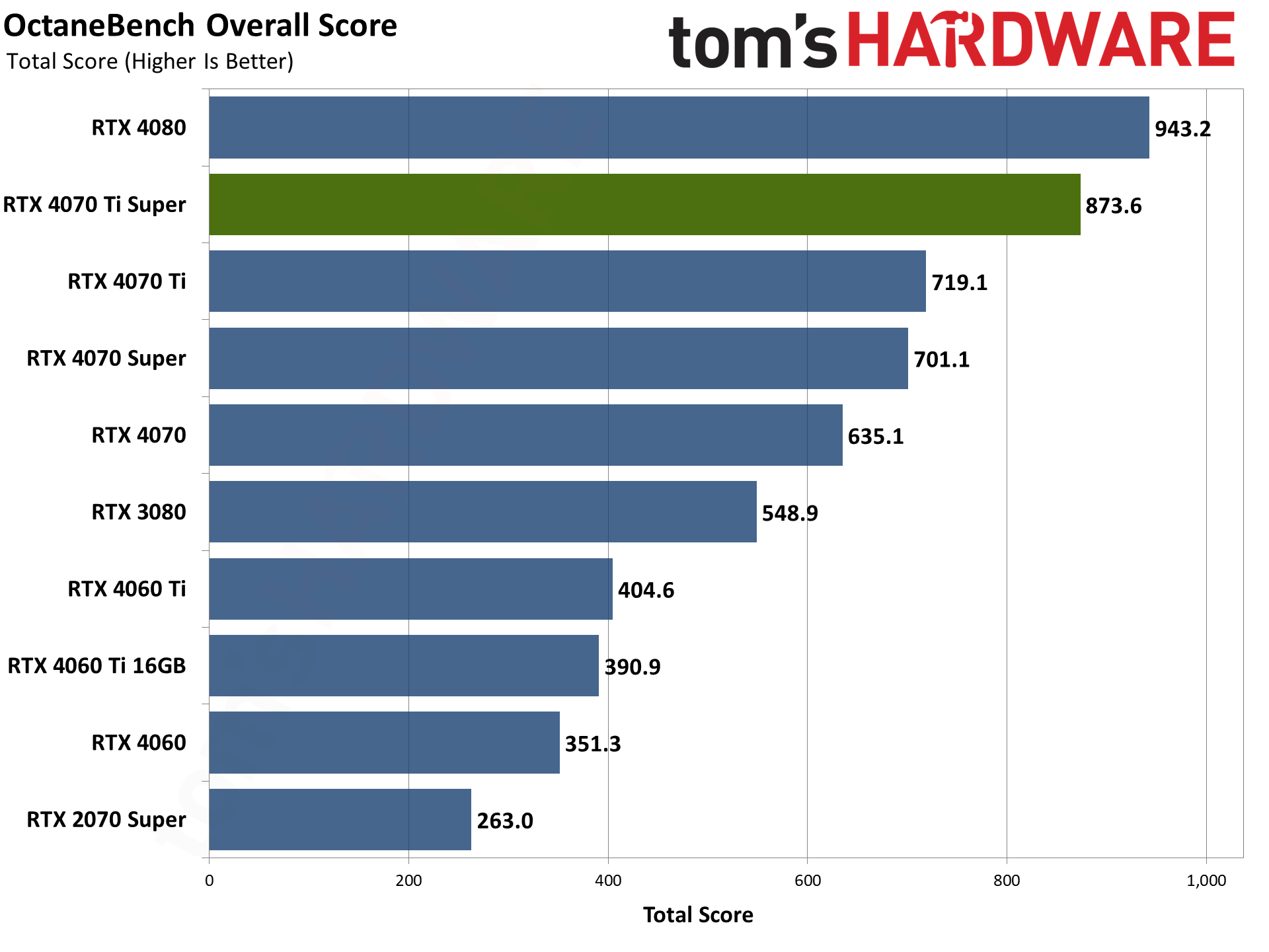
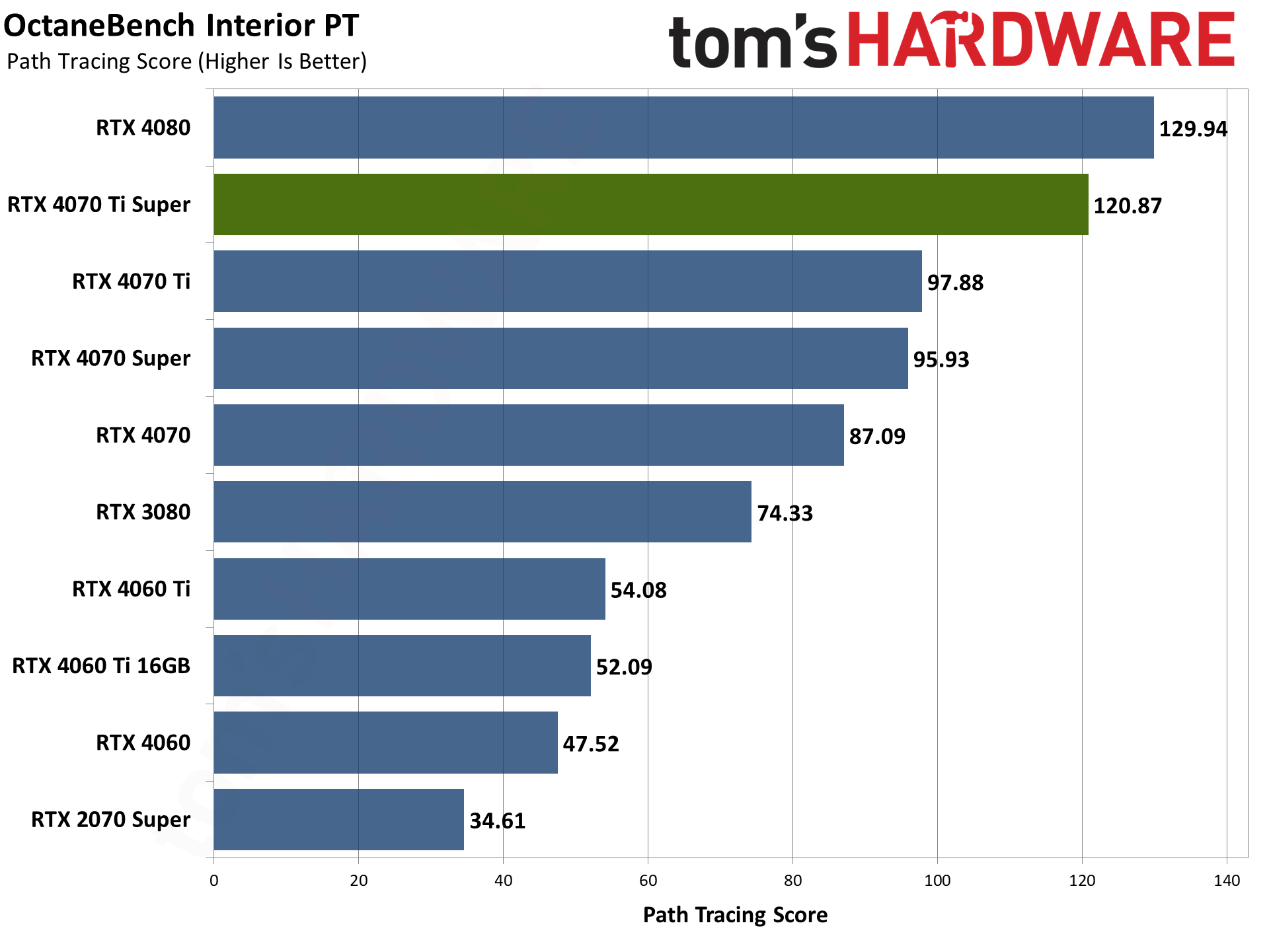
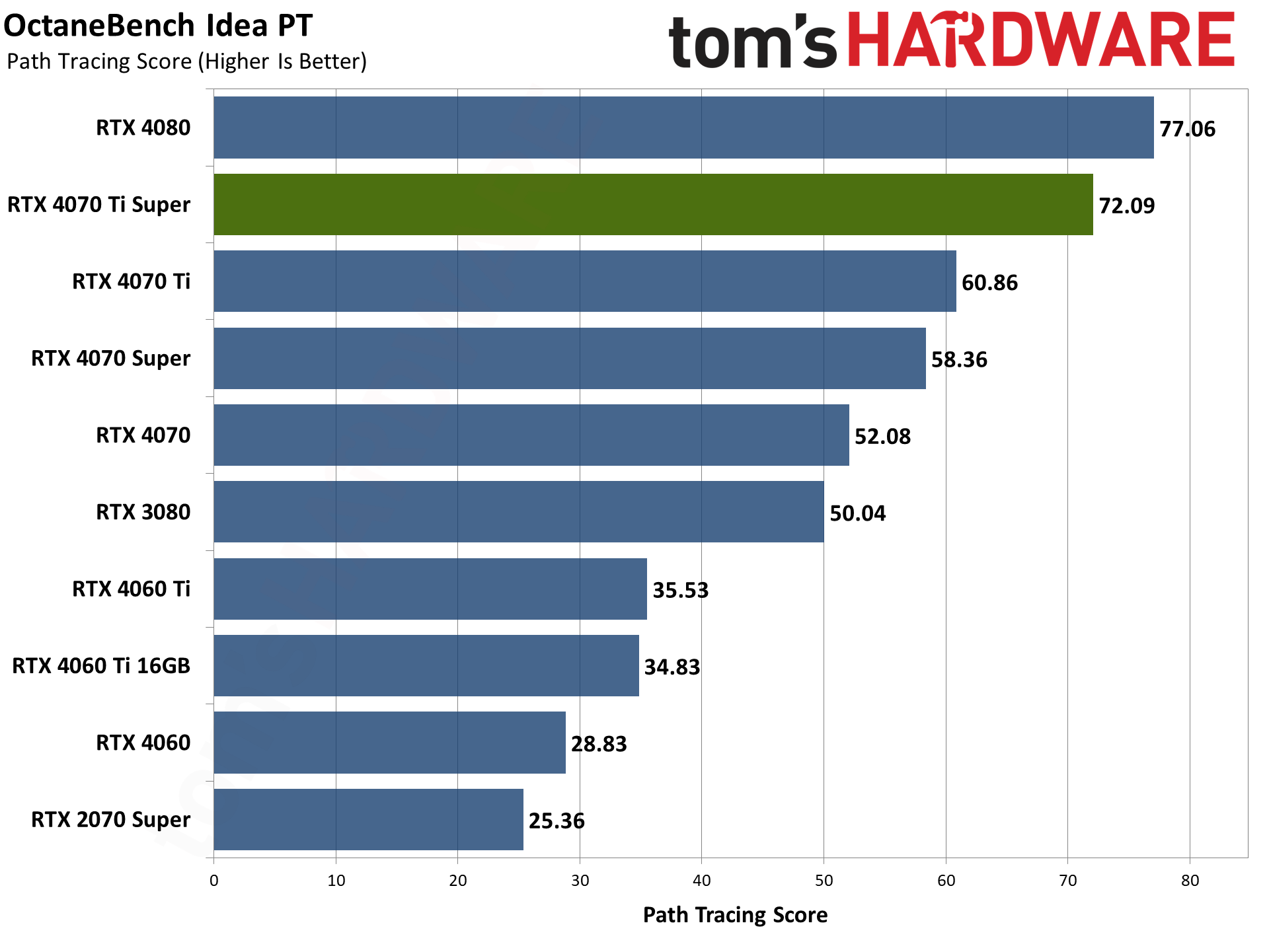
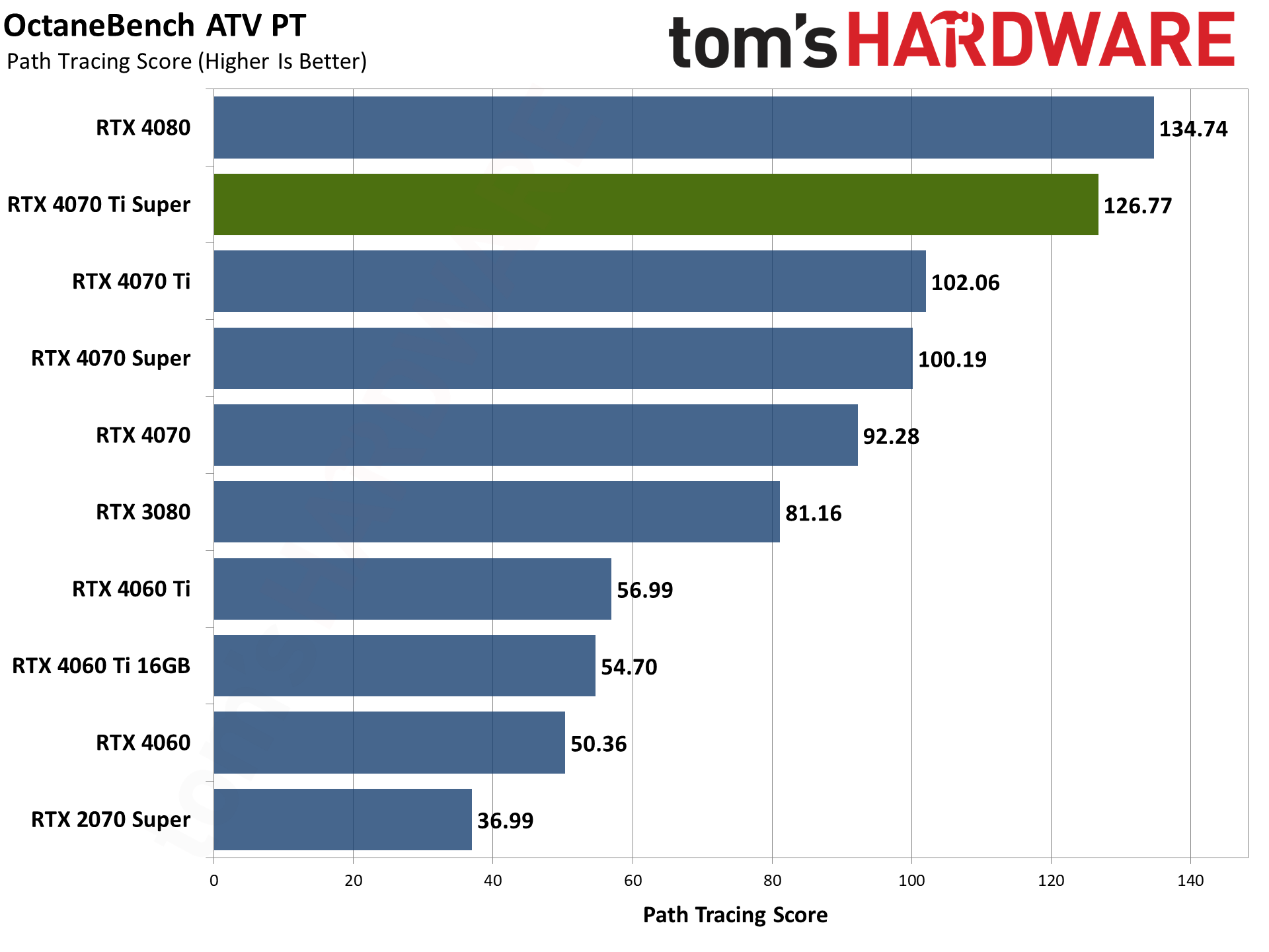
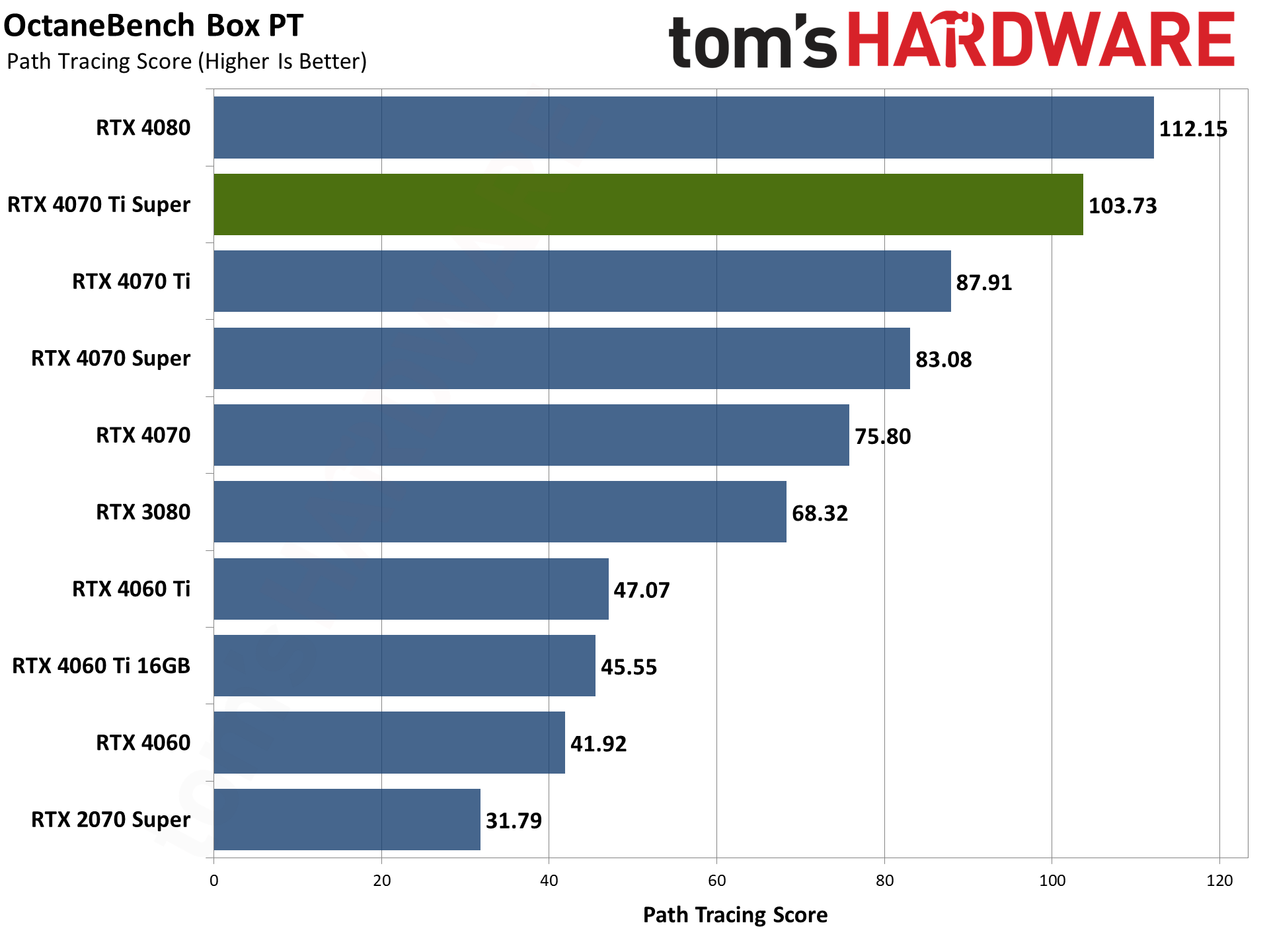
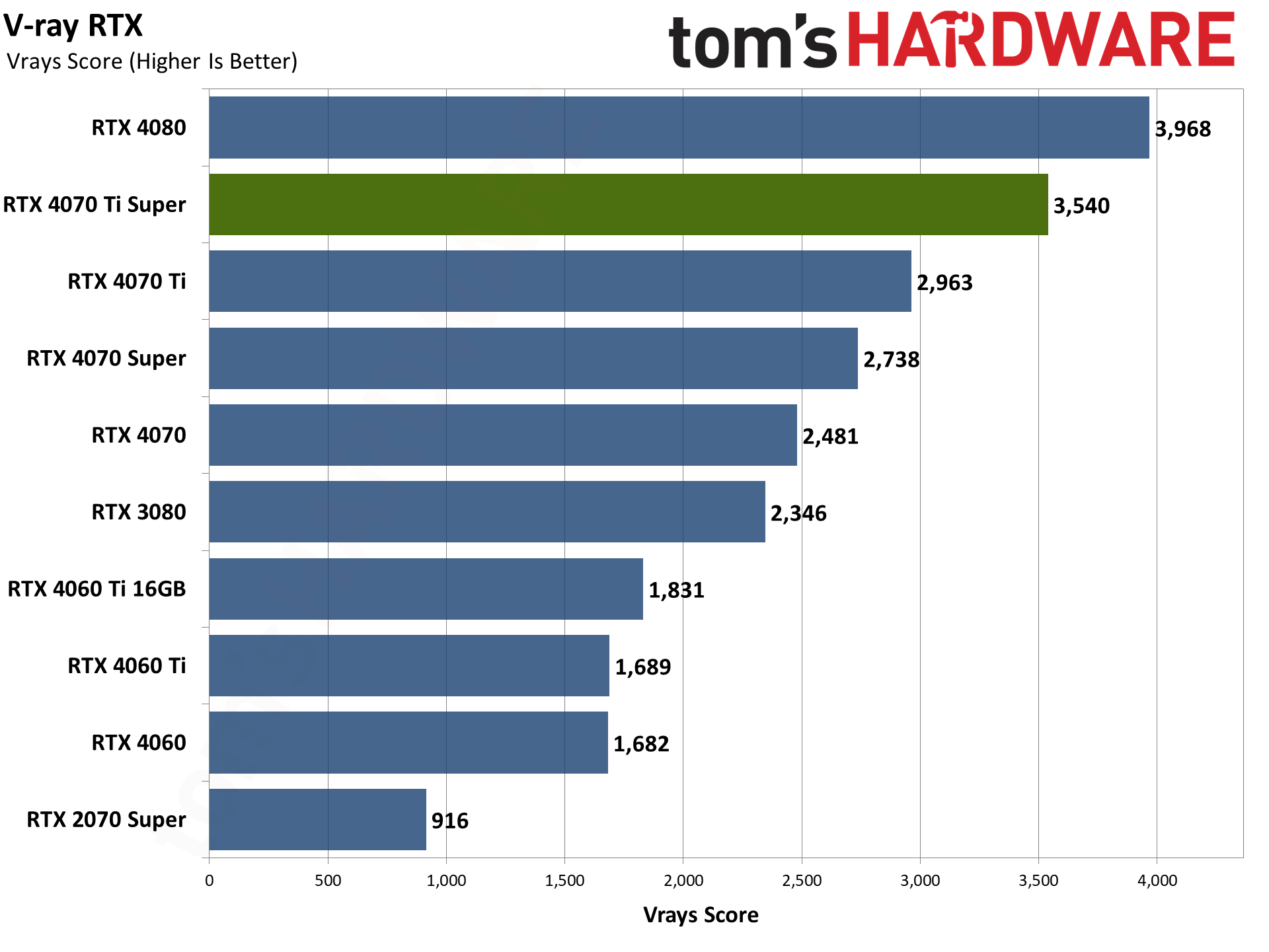
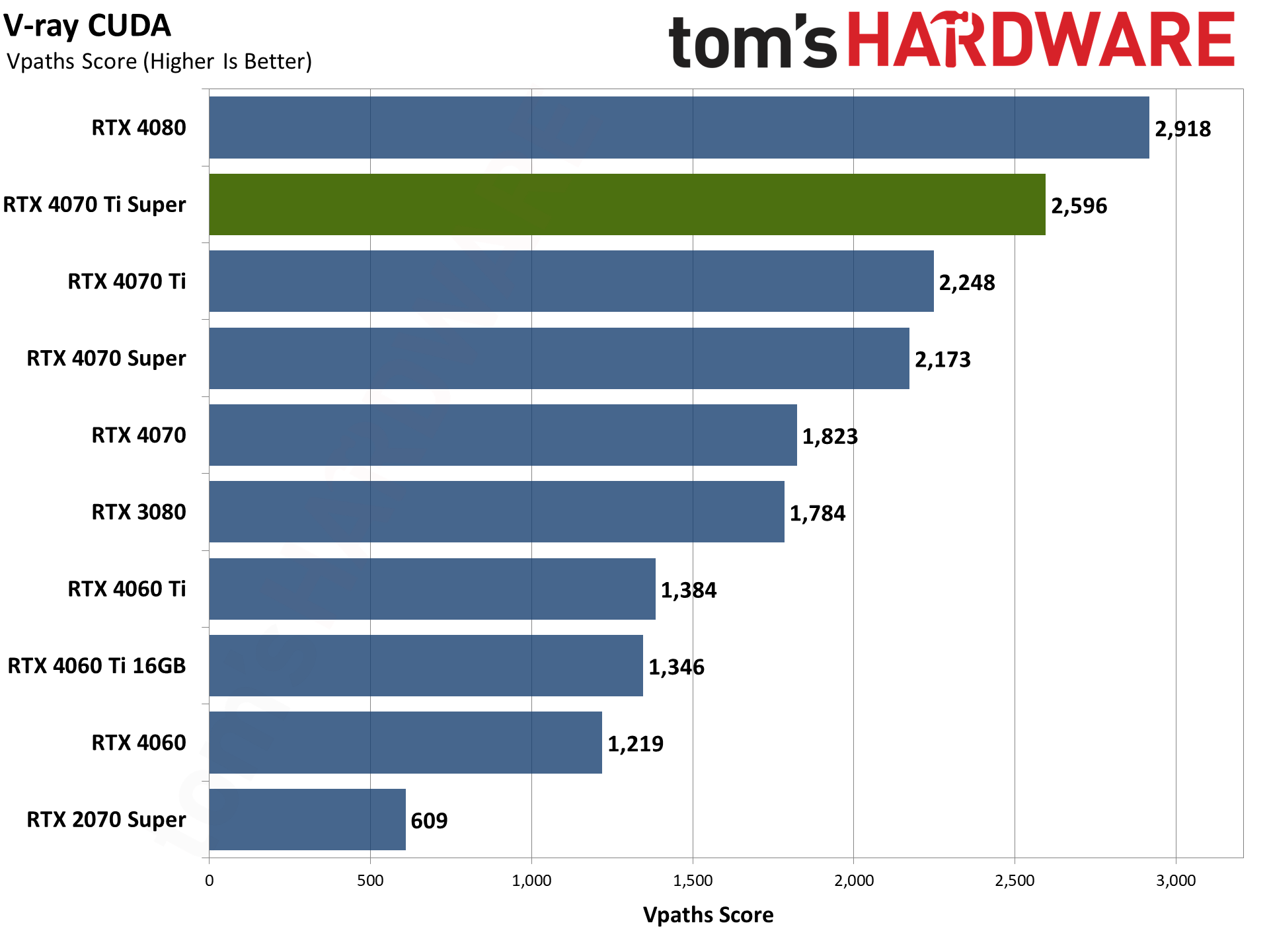
Nvidia also has RT hardware acceleration for Otoy OctaneRender and V-Ray, but the other GPU vendors currently lack hardware acceleration for these benchmarks. As such, we've only tested Nvidia GPUs in these applications. Once more, the 4070 Ti Super falls between the 4070 Ti and 4080, and memory bandwidth looks to be a big factor. The new GPU is 22% faster in Octane and 20% faster in V-Ray (RTX mode, not CUDA), and only 7% slower than the 4080 in Octane and 11% slower in V-Ray.
Nvidia RTX 4070 Ti Super Content Creation Summary
Professional workloads aren't normally the primary use case for consumer GPUs. yes, you can run them, and some of them do just fine, but content creation professionals will usually opt for the additional support and performance offered by professional GPUs — or at least their employers will.
AI workloads on the other hand are mostly limited by one of two things: raw compute, or the amount of VRAM available. For workloads that fit within the memory of a consumer GPU, such cards are often faster than 'professional' solutions, since they have higher clocks and power limits. If you need more VRAM to hold the LLMs, however, that will generally require a high-end professional GPU to get either 32GB or 48GB of memory — with data center GPUs offering up to 160GB of VRAM.
- MORE: Best Graphics Cards
- MORE: GPU Benchmarks and Hierarchy
- MORE: All Graphics Content
Get Tom's Hardware's best news and in-depth reviews, straight to your inbox.
Current page: Nvidia RTX 4070 Ti Super: Professional Content Creation and AI Performance
Prev Page Nvidia RTX 4070 Ti Super: 1080p Gaming Performance Next Page Nvidia RTX 4070 Ti Super: Power, Clocks, Temps, and Noise
Jarred Walton is a senior editor at Tom's Hardware focusing on everything GPU. He has been working as a tech journalist since 2004, writing for AnandTech, Maximum PC, and PC Gamer. From the first S3 Virge '3D decelerators' to today's GPUs, Jarred keeps up with all the latest graphics trends and is the one to ask about game performance.
-
Loadedaxe As always, very thorough review. I wish these insane prices would come down to normal levels.Reply
If no one had credit cards, they would not be selling well at all. I am still going to hold out until the offerings from both AMDs and Nvidias next gen arrives. -
AgentBirdnest Wow, that's... disappointing, honestly. Like Jarred mentioned, I too was expecting it to be closer to the 4080. At the very least, I thought it would consistently outperform the 7900XT at 1440p.Reply
I had my eye on this card to finally replace my RTX 2060, but after seeing these benchmarks, I'm not so sure.
Part of me wants to have the better memory specs, in case games coming over the next few years will benefit more from it (Alan Wake seems to show that.) And I may upgrade from 1440p to 4K, but not for at least a year. But futureproofing is hard, since I don't own a crystal ball.
The other part of me thinks the 4070 Super is close enough in performance, and I could use the saved $200 to buy a 4TB SSD that I could make use of. But I don't wanna regret my decision in 2 years.But with either choice, I'm sure I'll be absolutely ecstatic when I upgrade from my 2060. : P
In any case - awesome review, Jarred! You do great work. : ) -
Colif Nvidia repeating what they did with 2070 Super.Reply
4070 TI Super is mostly a 4080
2070 Super was mostly a 2080
Guess old play book worked back then.
8U_S8vrRs-Y -
DavidLejdar Thanks for the detailed review! I don't care much for ray-tracing. So, if I'd upgrade towards 4K, it looks like the RX 7900 XT would be a better option for me - as it is a bit cheaper and with a bit more rasterization performance.Reply
It sure ain't cheap. In my case, I easily miss out on some other stuff though. I.e., it hasn't been until 2023 that I got me a smartphone (and then only a cheap one) - meanwhile at home, a rig with DDR5 RAM already, which should last some years.Loadedaxe said:As always, very thorough review. I wish these insane prices would come down to normal levels.
If no one had credit cards, they would not be selling well at all. I am still going to hold out until the offerings from both AMDs and Nvidias next gen arrives.
Also, here in Germany, we have universal health-care and federal minimum wage of 12.42 Euro. So even with locally low salary (full-time), and after payslip-deductions (such as for that mandatory health-care insurance), and with not too high a rent (as not every owner here needs money for a golf course), it is possible to save up a bit for a rig (without worry of needing a fortune for medical expenses).
And some accountancy helps too. Like, when someone spends i.e. $2 a day on fizzy drinks, drinking water instead means a saving of nearly $60 a month, or $720 a year. Smoking? Smoke some less. And voila, $800 for a GPU, while having improved health.
Not saying that I will get me a new GPU soon, and no reason to overspend of course. And if I'd be living in the countryside, to begin with, I'd would likely need a car and pay insurance for it, even if driving only a few miles every day on empty roads. Etc. But if one can put aside some $40 a month (without interest rate), not that tough to have a modern rig. -
cknobman AMD will likely need to lower the MSRP of the 7900 cards.Reply
Smart move would be to match the 7900XTX msrp to the new 4070ti Super. -
Devoteicon Reply
They are normal.Loadedaxe said:I wish these insane prices would come down to normal levels. -
Eximo All I can say is, go Intel? Need a disruption in the upper mid-range for sure. Even if it is 4070 Super / 7800XT levels of performance that would kick off some re-pricing.Reply -
FoxtrotMichael-1 Reply
I'm not sure what else you spend your money on but inflation has affected every aspect of the economy. Just about everything I buy for a family of 5 is twice as expensive as it was a decade ago.Loadedaxe said:I wish these insane prices would come down to normal levels. -
Gururu Reply
100% agree and watching for itEximo said:All I can say is, go Intel? Need a disruption in the upper mid-range for sure. Even if it is 4070 Super / 7800XT levels of performance that would kick off some re-pricing. -
edzieba ReplyThere's surprisingly little uplift in most games from the memory upgrades
No surprise at all: the 4xxx (and 3xxxs) series have not been memory capacity limited in any of the cards released thus far. Even the 4060Ti 8/16gb only started to see serious performance disparities when settings were cranked far enough for the performance choice to be between "not very good" and "still not very good", so 12GB/16GB is going to offer naff-all in real world testing.
Remember: buy cards based on actual benchmarking (ideally of the games you play), not based on numbers on the box.
